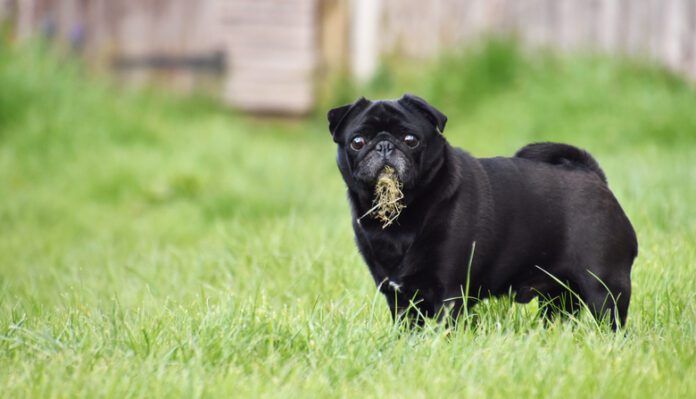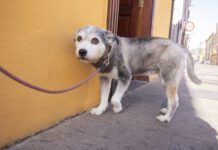If you’ve noticed your dog eating grass, you might be relieved to hear that this is a common dog behavior, and, contrary to conventional wisdom, it is usually not because your dog has an upset stomach.
“But she throws up after she eats grass,” you say. “Doesn’t this mean her tummy is upset?”
Actually, no. Fewer than 25% of dogs who eat grass chuck it up afterward, and only about 10% of grass-eating dogs show signs of illness prior to grazing. So, rather than eating grass because they needed to throw up, most dogs who do throw up probably do it as an incidental after-effect.
So why do dogs eat grass?
Dogs have a natural carnivorous bias, meaning their teeth, digestive systems, and preferences lean toward eating meat. As historical scavengers, though, they also eat vegetable matter. The simplest explanation for grass-eating is that some dogs just like it. It tastes good and they like the sensation of grass in their mouths.
Dogs do need roughage in their diet, and grass can be a good source of fiber. A lack of roughage can be detrimental to your dog’s ability to digest food and eliminate normally, so eating grass may actually be beneficial to the canine digestive system.

Reasons and solutions for grass-eating: How to stop your dog from eating grass
That said, there are some medical explanations for the grass-grazing habits of some dogs. Frequent grass-eating dogs who show indications of digestive distress may have a medical problem such as gastric reflux, inflammatory bowel disease, or pancreatitis. If your dog shows signs of stomach discomfort a prompt visit to your veterinarian is called for to rule out or treat serious medical conditions.
There are also potential behavioral reasons for this behavior. A bored dog may graze on greens for lack of anything better to do. The solution? Increase exercise and provide enrichment alternatives to reduce her desire to mow your lawn. Food-dispensing toys, scent work, “sniff walks,” canine play dates, and cognition games are excellent enrichment activities.
Stress can also lead to grass-guzzling. Chewing is a great stress reliever, and from a dog’s perspective, grass is a chewable stress object, especially absent more appropriate chew options. The solution? Explore ways to reduce her stress and be sure to provide appropriate high-value chew objects. (Sturdy toys stuffed with food and frozen top our list.)
Attention-seeking is another explanation. Your canine pal may offer behaviors to get you to engage in activities with her. If grass-eating successfully prompts you to interact with her, you are reinforcing the behavior and increasing the likelihood she’ll do it more. The solution? Ignore her when she’s munching grass and pay attention to her when she’s engaged in activities you prefer.
When should I stop my dog from eating grass?
The biggest risk to your dog from grass-eating is ingesting lawn chemicals. If you treat your yard (or walk where grass is treated) then you must prevent her from munching on the greens. You could fence off part of your yard that you pave, gravel, or don’t treat so she can have a free-play area. Otherwise, walk her where it’s safe, and/or use treats or toys (play tug!) to reinforce her for keeping her head up when walking on grass.







My dog likes to eat a little grass now and then, and when he has tummy upset (thankfully this is a rare event) he eats it frantically. I would like to plant a little patch of grass for him for this purpose as we are transitioning away from having a traditional backyard lawn (it’s mostly weeds at this point, anyway). I tried planting wheatgrass, but he wasn’t interested in it. This might be the most “spoiled dog” question ever: Is there a type of grass that is recommended?
Hi, my dog is the same, also I live in a small unit with no grass in the tiny patch of backyard. So I watched which type of grass she wanted to eat, only 1 mind you, and I pulled up a few clumps on our walks and re-planted them in a large pot. Hey Preston….breakfast is served!
My dogs stopped eating grass after I started adding green beans to their diet.
Interesting June. I tried something similar, and started adding spinach and parsley to their diet, but it seemed to have no effect on their grass eating.
I also tried green beans, sometimes fresh steamed broccoli, and it helped my dog as well.
I’m convinced my dog eats grass in all its forms (dried, fermented, rotted, and pre-digested by my horses) because he was essentially starved by his previous owners who fed him food he wouldn’t actually eat. I’m sure stress is also involved.
My neighbor planted rye in a field next to us. The dogs LOVED it. Don’t know to recommed it though. It got about 4-5 feet tall. It was cut to feed the cattle, but stray seeds are of course staying around.
My Lab LOVES kale! He won’t eat any other type of greens but every morning he waits for his kale. He can’t eat grass because he wears an OutFox mask at all times when he’s outside (he has pica, he eats rocks). My Lab/Golden won’t touch any sort of raw veggies but she will eat grass occasionally
My dog has seasonal allergies that she takes Benadryl for. On a rare occasion when her dose is later than usual, like clockwork, her nose runs and her right ear bothers her. First thing she wants to when she goes outside is head for the grass. I am convinced she is getting an upset stomach because her allergies are causing drainage down her throat into her belly. She is almost always on Benadryl throughout the year but how much she needs changes with the seasons. After careful observation over the years, the grass eating only seems to happens when her seasonal allergies are bothering her because of an occasional missed dose of Benadryl.
My village dog eats grass daily. He usually throws it up soon after. I have not responded. He is going on 5 years. I have mentioned this to vets, they say don’t worry about it. I take him to state parks or numerous dog parks daily so he is not inactive. He loves the woods and chases rodents. He will stop to eat grass if he hadn’t already that day. I can usually spot a nice batch to nibble. I feed him Annamaet lean kibble, about a third+ cup boiled chicken, plus dark rice and pumpkin daily. I want to add some grass type vegetable that may satisfy whatever need his taste for grass is. Open to suggestions.
Diana pawPrints loves to roll in the grass. Her favorite thing on walks since I have no grass to speak of in my yard. However, when the sweet spring crass crops up all over she loves to graze that. She doesn’t eat so much she throws up and it doesn’t seem to bother her. And it’s not a year round thing or all grass. It’s only in Spring and only that sweet spring grass. So I see no problem with it.
Freyja doesn’t seem to have any dietary quirks, at least none I have identified yet.
I’ve had dogs eat some pretty weird stuff in the past. Caesar learned to pull his lips back and use only his teeth to gently pull ripe boysenberries off of the vines in my parent’s yard. He was a fruit eater and would beg pitted sweet cherries or a slice of apple. Ramses ate citrus. Not a lot but if I had sweet mandarin oranges he would beg until I gave him a section. He’d take it to his bed, drop it, lick it, eat it and then come back and beg for another one. He also loved the cooked carrots from the Greek place I used to get a Gyros dinner to go. I don’t like cooked carrots but he was all for them.
One of my parent’s dogs, I can’t remember if it was Candy or is Dolly, eats the pears that drop to the ground. Not the whole thing, just bite a chunk out of it , chew and swallow.
I have a dog that eats grass every time he is out in the yard. He also eats grass while on walks if he is allowed. He never throws up. He just seems to enjoy eating grass.
I include vegetables with his evening meal. Green beans, carrots, broccoli, etc. he loves these, but still eats his grass.
My vet says,”some people chew tobacco “ and I am inclined to agree.
This article is so comforting. My girl waits for a certain grass to come up each spring and then tries to chow down on as much as she can before I guide her out of it. She never throws up afterwards. Now I feel confident in letter her enjoy her greens on our walks! Thank you